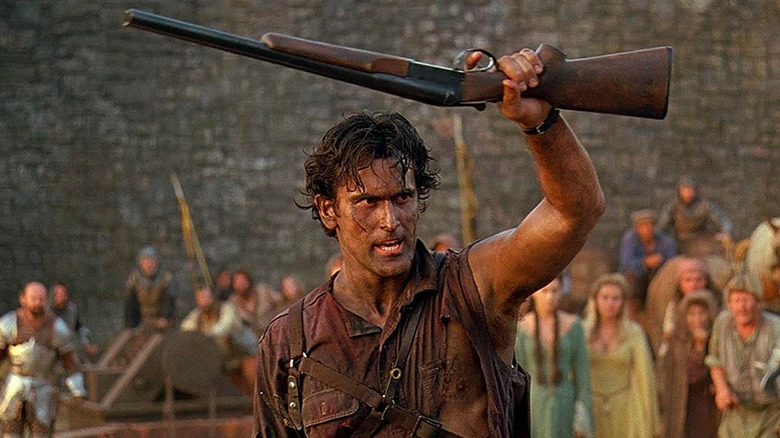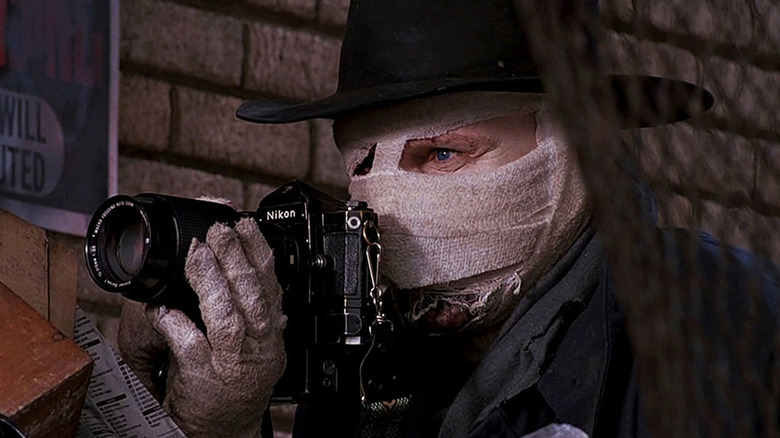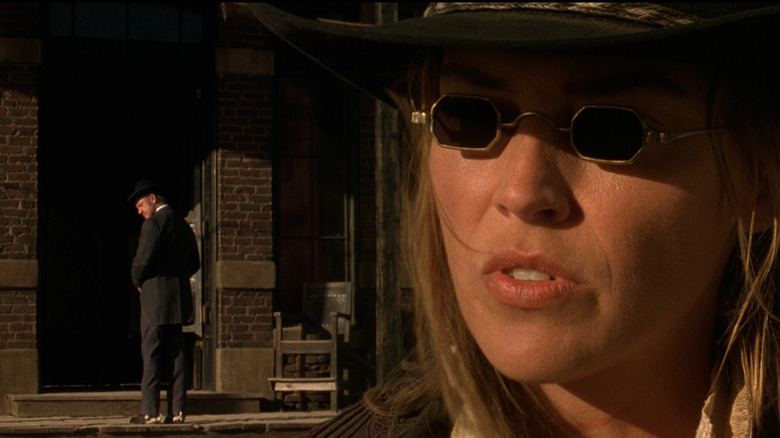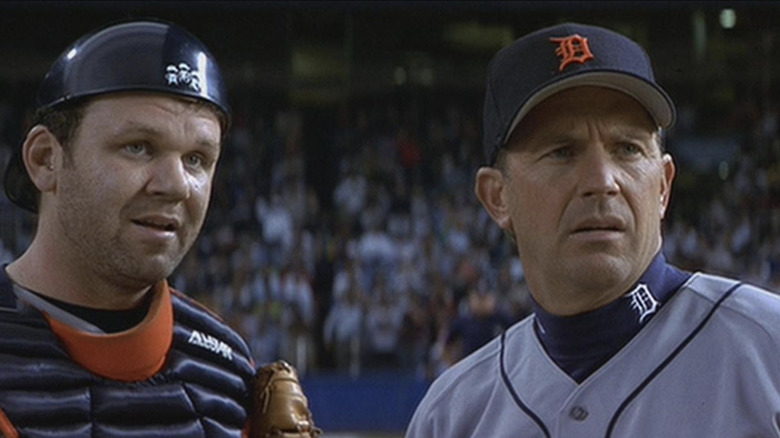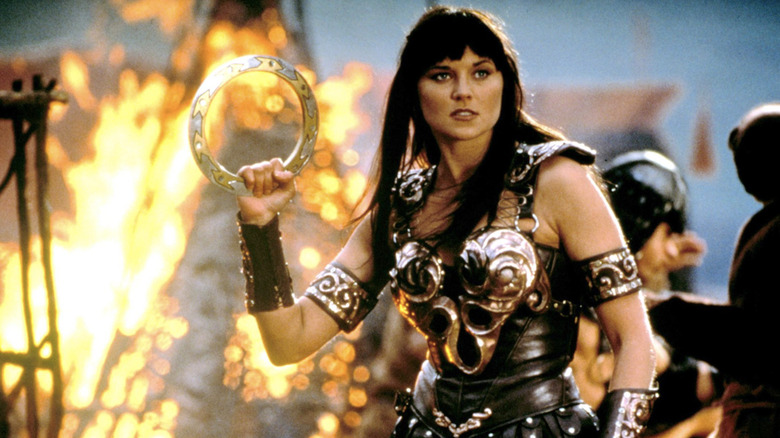Doctor Strange 2 Director Sam Raimi Had One Of The Most Interesting Filmographies Of The '90s
When directors are fortunate enough to enjoy a longstanding career, little trademarks or auteur styles have a tendency to appear. Spike Lee loves a jump cut, Michael Bay brings the Bayhem, Quentin Tarantino loves to include trunk shot camera angles, and Wes Anderson movies all look like, well, Wes Anderson movies. For the most part, directors with a signature style tend to play in the same sandbox of genre, or at the very least, the same playground, but Sam Raimi is the type of director who is unafraid to tackle anything and everything. His debut feature "The Evil Dead" turned him into a god in the eyes of horror fans in the 1980s, his tackling of the original "Spider-Man" trilogy in the 2000s ushered in the wave of modern superhero films as we know it, but in the 1990s, Raimi proved that he's the kind of director who can do it all.
Of course, he's not the only director to explore different genres of films, but the variety in his filmography throughout the 1990s is one of the most fascinating of any mainstream American director. From a feisty superhero film, a period piece horror-comedy, a pro-woman revisionist Western, a bleak crime thriller, a sports movie romance, and a whole slew of fantasy action television, Raimi refused to let himself get pigeon-holed into becoming a one-note director. His diverse resume is impressive not only as a showcase of his talent, but because the ability for a director to lend their vision to such a wide range of cinematic styles is almost unheard of these days, especially when all of the films were moderate successes at best, and flops with a cult following and worst.
Sam's Raimiest films of the 1990s
Raimi opened the decade with "Darkman," an original superhero film he wrote after he was unsuccessful in securing the rights to "The Shadow." The story follows a scientist named Dr. Peyton Westlake (Liam Neeson) who is attacked with acid and left for dead by a mobster. Dr. Westlake tries to cure himself of his injuries, but unintentionally develops superpowers that come with the side-effect of driving him clinically insane. Now, obsessed with vengeance, he swears to take down the men who made him this way. The film was his first foray into studio films, having proved his talent on shoestring budgets. "Darkman" was hailed for its stylish approach to superhero cinema, and despite its darkness and gruesome special effects, it's unapologetically fun to watch. Raimi thrives in genre-bending, and his twisted tale of Universal Monsters meets DC/Marvel Comics feels right at home alongside his usual brand of storytelling.
After the success of "Darkman," Raimi convinced Universal Pictures to give him a ton of money to make "Army of Darkness," complete with sending Bruce Campbell's Ash into the Middle Ages. Only now, Ash isn't a wayward hero, he's a massive a-hole. Plenty criticize this character shift, but it works perfectly. Watching him struggle in "Evil Dead" makes us root for his survival. Watching him get kicked around by skeletons with swords for being a bully in "Army of Darkness" makes us cheer for his comeuppance. "Army of Darkness" Ash is the personification of what a huge dork thinks it takes to be cool, and that's exactly who Ashley J. Williams has always been. The film is an exquisite spread of everything that makes Raimi so interesting to watch like Harryhausen-inspired stop-motion monsters, campy one-liners, terrifying horror elements, and an overall vibe of pure joy. When looking at the overall picture of Raimi's entire career, "Army of Darkness" is like throwing all of his strengths and sensibilities in a blender and shotgunning the results.
The Raimi-adjacent films
For whatever reason (I'm blaming the success of "Dances with Wolves") Westerns had a huge resurgence in the 1990s. Sam Raimi was chosen by Sony to direct "The Quick and the Dead," drawing inspiration from Spaghetti Westerns of the 1960s and 1970s but given Raimi's auteur style. There are enough dutch angle dolly zooms in this film to make someone feel disoriented, but it works. "The Quick and the Dead" has the heart of a classic Western, but revamped for modern audiences with snappier taste. "Western" is likely not the first genre referenced when discussing Raimi, but he still managed to make one of the most visually interesting westerns in the genre. Boasting a cast of Sharon Stone, Gene Hackman, Russell Crowe, Leonardo DiCaprio, and Keith David, "The Quick and the Dead" proved that Raimi knew how to direct both established names and stars on the rise, and the film remains one of his most underrated.
Toward the end of the decade, Raimi found himself in "elite conversations" after the film "A Simple Plan" was nominated for two Academy Awards. The neo-noir crime thriller marked a genuinely serious turn for Raimi, delivering a cross between "Fargo" and "Very Bad Things" with dynamite performances from Bill Paxton, Billy Bob Thornton, and Bridget Fonda. The film is considered by many to be his greatest non-horror venture, as Raimi successfully spread tension across an entire run time. While the tone may feel a bit more serious than his usual fare, there are still Raimi-esque moments of dark comedy scattered throughout, as well as one of the best examples of his thematic interest in opening Pandora's box.
The un-Ramiest entry
You can't hit a home run every time, and that's probably why his least "Raimi" film of the 1990s was a critical and financial flop. "For Love of the Game" is a romance drama set against the background of an aging baseball player, and Raimi took the job wanting to try something different. It unfortunately backfired. Roger Ebert famously called the film,
"The most lugubrious and soppy love story in many a moon, a step backward for director Sam Raimi after 'A Simple Plan,' and yet another movie in which Kevin Costner plays a character who has all the right window dressing but is neither juicy nor interesting."
Despite the film's failure, it's genuinely fascinating that Raimi was ever given the chance to try his hand at a romantic sports drama, as the story is miles out of his wheelhouse. "For Love of the Game" is earnest to a fault, but there's something endearing about watching Costner's Billy Chapel try his best to keep the affections of Jane Aubrey (the late Kelly Preston), with shots of their love resembling what we'd later see in "Spider-Man" between Tobey Maguire's Peter Parker and Kirsten Dunst's Mary Jane Watson. The film also marks the first collaboration with Raimi and J.K. Simmons, who would go on to reach superhero film legend status as J. Jonah Jameson in "Spider-Man."
Raimi on the small screen
Raimi stayed busy throughout the 1990s not only with movies but by writing and producing high-concept television series. "Xena: Warrior Princess" became a pop culture game-changer, he had his hands in just about every incarnation of the "Hercules" story, he executive produced the deeply polarizing horror series "American Gothic," the criminally underrated action/adventure series "Spy Game," and the superhero crime-fighting series, "M.A.N.T.I.S." The television programs were just as varied as his filmography, but it could be argued that they were companion pieces to his features.
"Xena" and "Hercules" share a similar setting and tone as "Army of Darkness," both "M.A.N.T.I.S." and "Darkman" exist as non-traditional superhero stories, the playful homage energy of "Spy Game" feels reminiscent of how "The Quick and the Dead" played with western tropes, and "American Gothic" feels right at home with "A Simple Plan." As heterogeneous as Raimi's output in the 1990s appears to be on the surface, his presence can be felt and quickly identified throughout them all. As Hollywood continues to relegate directors into familiar niches, Raimi is proof that creative exploration is an exciting risk to take. Talent is talent, and Raimi has it by the bushels.
